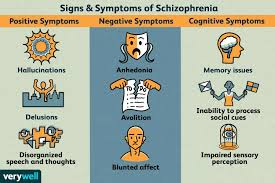The nurse is caring for a client diagnosed with schizophrenia. Which of the following should the nurse identify as findings consistent with schizophrenia? (Select all that apply.)
Schizophrenia can be cured with antidepressants.
Schizophrenia typically first presents in adolescence or early adulthood.
Antipsychotic medications can be used to manage symptoms of hallucinations and delusions.
Some clients with schizophrenia have a higher risk of substance abuse disorders.
Schizophrenia affects thoughts and perceptions.
Correct Answer : B,C,D,E
Choice A Reason:
Schizophrenia cannot be cured with antidepressants. Antidepressants may be used to treat comorbid depression in individuals with schizophrenia, but they do not address the core symptoms of schizophrenia itself. Schizophrenia is a chronic condition that typically requires lifelong treatment with antipsychotic medications to manage symptoms.
Choice B Reason:
Schizophrenia typically first presents in adolescence or early adulthood. This is the period when symptoms such as hallucinations, delusions, and disorganized thinking often first become apparent. The onset of schizophrenia during this developmental stage can significantly impact an individual's social and vocational abilities.
Choice C Reason:
Antipsychotic medications are the cornerstone of schizophrenia treatment. They can be used to manage symptoms of hallucinations and delusions, which are known as positive symptoms of schizophrenia. These medications work by affecting neurotransmitters in the brain, particularly dopamine.
Choice D Reason:
Individuals with schizophrenia have a higher risk of substance abuse disorders. Substance use can exacerbate symptoms of schizophrenia and complicate the course of the illness. It is important for treatment plans to address any co-occurring substance use disorders.
Choice E Reason:
Schizophrenia significantly affects thoughts and perceptions. It can cause distorted thinking patterns, false beliefs, and sensory experiences that others do not share. These symptoms can be distressing and may lead to difficulties in distinguishing reality.

Nursing Test Bank
Naxlex Comprehensive Predictor Exams
Related Questions
Correct Answer is D
Explanation
Choice A Reason:
An adventitious crisis is not applicable here. This type of crisis is usually a result of a natural or man-made disaster, war, or major accident, which is not the case with the client's situation.
Choice B Reason:
Maturational crises are associated with life transitions or developmental stages, such as retirement or menopause. While the client is older, the crisis is not due to a normal life transition but rather an unexpected event.
Choice C Reason:
Developmental crises occur as a person moves through the stages of life. The client's crisis does not stem from a developmental issue but from an external event that has disrupted their life.
Choice D Reason:
Situational crises arise from external sources that an individual may face throughout life, such as the death of a loved one, loss of a job, or severe illness. The client's inability to cope with the sudden death of their spouse is a situational crisis.
Correct Answer is A
Explanation
Choice A Reason:
This response may invalidate the client's experience and can be perceived as dismissive of the client's delusional thoughts. It does not acknowledge the client's current reality or provide any therapeutic communication. An intervention is required to guide the nurse in offering a more empathetic and validating response.
Choice B Reason:
Asking the client to clarify what they mean encourages communication and shows a willingness to understand the client's perspective. It is a therapeutic approach that can help the nurse gain insight into the client's thoughts and provide appropriate support.
Choice C Reason:
This response could potentially validate the client's delusional thinking by engaging in the content of the delusion. It might lead to further discussion about the delusion rather than redirecting the client to reality, which could be counterproductive.
Choice D Reason:
Expressing empathy by acknowledging that the client's feelings must be frightening is a therapeutic response. It validates the client's emotions without confirming the delusional content and can help the client feel understood and supported.
Whether you are a student looking to ace your exams or a practicing nurse seeking to enhance your expertise , our nursing education contents will empower you with the confidence and competence to make a difference in the lives of patients and become a respected leader in the healthcare field.
Visit Naxlex, invest in your future and unlock endless possibilities with our unparalleled nursing education contents today
Report Wrong Answer on the Current Question
Do you disagree with the answer? If yes, what is your expected answer? Explain.
Kindly be descriptive with the issue you are facing.
